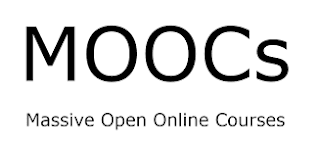MOOCs
Have you ever heard about MOOC?
So, if not, get ready , I will explain them to you now.
MOOC stands for Massive Open Online Course. They are distance-learning courses run online by many universities worldwide. Usually, they are open to anyone who registers. One single course may admit even thousands of students.
It is possible to study almost any subject through this method, and dozens of famous universities worldwide are now offering MOOCs. They can be treated as a standalone study for individuals interested in a particular subject matter, or consolidation study for a course you are already following.
MOOCs - providing open studies to everyone
MOOCs give students the option of studying a subject in depth without the constraints of a traditional university course. They can be anywhere in the world as the resources are all online and they do not require previous qualifications. They are open to anyone, regardless of whether or not they have studied before.
Students can simply follow the course at their own pace, taking as much time as they need. However, most MOOCs are available for a limited amount of time so in most cases, the online lectures and webinars won’t be available for more than one year.
Here are some main platforms offering great MOOCs:
Coursera
edX
Udacity
Udemy
Flexible assessment of MOOCs
MOOCs usually have no end-of-course assessment or exams that need to be passed. Instead, there are often weekly online quizzes or peer-assessed assignments, but mostly optional. However, they are a good opportunity to test your knowledge and see how much of what you learned and studied you managed to acquire.
Instead of face-to-face lectures or seminars, classes are recorded on video and materials are uploaded to the platform. The student can then access them whenever, and wherever, they want to. It is possible to review the material as often as required, so that rather than having to rely on sketchy lecture notes, you can view the lecture again.
A MOOC is free or almost free
Unlike traditional university courses, most MOOCs are available free of charge – there is no worry of having to pay huge tuition fees! Some may have a small registration fee but these are rare exceptions. In addition, sometimes, you may also have to pay for learning materials, but most universities will try to provide them online at no cost as well.
One big drawback for students considering a MOOC is that there is rarely any kind of accreditation available for the course. There is no degree title awarded at the end of the programme. Some courses are beginning to offer certificates, but by and large, there is nothing to prove you have studied on a certain course.
Recently, in exchange for a small fee, some universities have started to provide a certificate once you complete a MOOC. However, if your goal is to receive some kind of diploma or certification, you should first check with the university to see if this would be an option.
MOOCs - a great alternative to boost your knowledge
It is also usually impossible to gain credits towards your degree after completing a MOOC so they just serve to expand the knowledge you already have, rather than giving you a formal qualification.
One big drawback for students considering a MOOC is that there is rarely any kind of accreditation available for the course. There is no degree title awarded at the end of the programme. Some courses are beginning to offer certificates, but by and large, there is nothing to prove you have studied on a certain course.
The good news is that over the years, more universities have decided to introduce massive open online courses so the palette of study options is getting larger, more diverse and appealing. The only thing left for you to do is to conduct extensive research and find a course that suits your learning goals.
MOOCs connect thousands of students worldwide
Although you may be studying from a remote location, you will not be alone: there are lots of online study communities. Just like in a traditional university, MOOC students have access to discussions with other students, as well as forums and message boards.
In some MOOCs, over 50,000 students are attending the same online classes and engage in online discussions with professors and fellow peers. You can engage and connect with students from around the world, all of them interested in the same subject you chose to study.
MOOCs are a great, cheap way to consolidate learning or study new courses set up by world-famous universities, without having to leave home.

Комментарии
Отправить комментарий